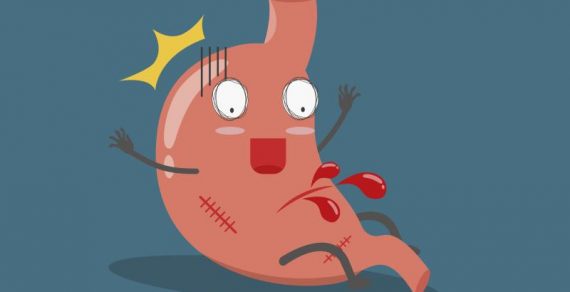If you have ever seen vomiting blood, đi ngoài phân đen, or fresh blood in the stool, don't be subjective! This article will explain simple, the easiest to understand about the causes, treatment, and prevention of gastrointestinal bleeding.
1. What is Gastrointestinal Bleeding? Understand It Correctly in 1 Minute
Hệ tiêu hóa của chúng ta giống như một “đường ống” dài từ miệng đến hậu môn. Khi bất kỳ điểm nào trong “đường ống” này chảy máu, đó gọi là gastrointestinal bleedingDepending on the location of the bleeding (above or below), the symptoms will be different:
- Upper gastrointestinal bleeding (esophagus, stomach, duodenum): Vomiting bright red or brown like coffee grounds, black, mushy stools with a strong odor.
- Lower gastrointestinal bleeding (small intestine, colon, rectum and anus): Fresh blood mixed in stool, stool sticky with red blood or black stool.
⚠️ NoteEven if you see BLOOD in the stool/vomit just ONCE, go to the hospital IMMEDIATELY!
2. Causes of Gastrointestinal Bleeding
Gastrointestinal bleeding can be symptom of health issues. Below are common causes:
2.1. Causes of upper gastrointestinal bleeding
- Stomach ulceroften drink a lot of alcohol, abuse painkillers (such as paracetamol).
- Esophageal tear (Mallory-Weiss): often after drinking a lot of alcohol and vomiting a lot
- Esophageal variceal ruptureCommonly seen in people with cirrhosis.
- Stomach cancerBleeding accompanied by weight loss and prolonged fatigue.
2.2. Causes of lower gastrointestinal bleeding
- PigeonFresh blood on the toilet paper, not mixed with feces.
- Torn anusPainful when going to the bathroom.
- Inflammatory bowel disease (Ulcerative colitis with bleeding, Crohn's disease): prolonged diarrhea with bloody mucus
- Colon cancerThin mucus, with blood, changes in bowel habits, weight loss.
3. Diagnosis Method: How Doctors 'See Through' Your Body!
When bleeding occurs in the digestive system, identifying the exact cause is like a fascinating 'clue hunt'. Fortunately, with modern medical technology, doctors can 'journey' deep inside your body using simple yet miraculous methods!
3.1. "Detective" Super Small Camera
- Gastrointestinal endoscopy: Imagine a thin, flexible wire, equipped with a tiny camera, gently passed through the mouth to explore the esophagus, stomach, and the beginning of the small intestine. This 'detective' will detect ulcers, inflamed areas, or even abnormal tumors that are causing bleeding.
- Colonoscopy: On the contrary, if there is suspicion of blood flowing from the colon or rectum, the doctor will use an endoscope to examine through the anus. Suspected conditions such as polyps, inflammatory lesions, or signs of cancer will not be able to escape!
3.2. Other Effective Assistants
- Blood test: helps assess how much blood you have lost and whether your body is anemic, and if a blood transfusion is necessary.
- Abdominal computed tomography scan: This medical imaging technology helps doctors see detailed images inside the abdomen, detecting unusual bleeding points.
- Stool test: Sometimes the blood that oozes out cannot be seen by the naked eye, but this test will detect hidden blood in the stool.
4. Treatment of Gastrointestinal Bleeding
When gastrointestinal bleeding occurs, treatment is like a 'campaign' designed specifically for each individual, based on the cause and severity. Don't worry – modern medicine has all the advanced 'weapons' to handle this situation quickly and effectively!
Depending on the injury and the cause of gastrointestinal bleeding, the doctor will choose the appropriate method to treat the patient. For example:
4.1. Endoscopic Hemostasis Intervention
- Electric burningUsing high temperature to 'seal' the bleeding blood vessels, just like a plumber closing a leaking valve.
- Vasoconstrictor injection: Administer the medication directly into the wound, helping the blood vessels to constrict and stop the bleeding.
- Clip holder: Attach a tiny metal clip to the damaged blood vessel, just like a plastic bag clip to prevent blood from spilling out!
- …
4.2. Medication Treatment - Healing Wounds from the Inside
If the cause is due to gastric ulcers, the doctor will prescribe medication. acid-reducing medication (PPI group). They act as “guards” preventing the stomach from secreting excess acid, creating an ideal environment for the ulcer to heal on its own. You just need to take the medication regularly – as simple as taking care of a scratch on your skin!
…
4.3. Surgery - Embolization of the Bleeding Vessel
In cases of massive bleeding or when it cannot be managed through endoscopy, embolization of the bleeding site through interventional radiology or surgery will be considered to protect the patient's life. Don't be afraid! The medical team always carefully calculates to ensure maximum safety for you.
4. Simple Home Prevention Methods
- Limit the use of alcohol and tobacco: These are the factors that increase the risk of stomach ulcers and bleeding.
- Avoid using excessive pain medication: có thể “ăn mòn” niêm mạc dạ dày nếu lạm dụng
- Healthy lifestyle: Exercise 30 minutes a day helps blood circulation, the digestive system operates smoothly. Reduce stress through meditation, yoga – as prolonged stress can 'burn' the stomach from the inside
- Regular health check-ups: To detect early gastrointestinal disorders such as polyps or cancer.
- Diet high in fiber helps prevent constipation and hemorrhoids. Drink enough 2 liters of water per day helps food to 'slide' smoothly through the intestines, preventing damage.
🎯 Thông Điệp Từ Chuyên Gia
Gastrointestinal bleeding is a condition that requires timely diagnosis and treatment to avoid serious complications. If you notice any signs of gastrointestinal bleeding, please contact your doctor immediately for appropriate consultation and treatment.
Reference document
- MedlinePlus. Gastrointestinal bleeding. MedlinePlus. Updated September 12, 2023. Accessed October 25, 2023. https://medlineplus.gov/gastrointestinalbleeding.html
#TimelyEmergencyCare #DangerSigns #CameraEndoscopy #PreventingDiseaseBetterThanTreatingDisease #GastricUlcer #Hemorrhoids #ColonCancer #HealthyEating #NoAlcoholNoSmoking #RegularHealthCheckups #HealthyLivingEveryDay #GastrointestinalBleeding

